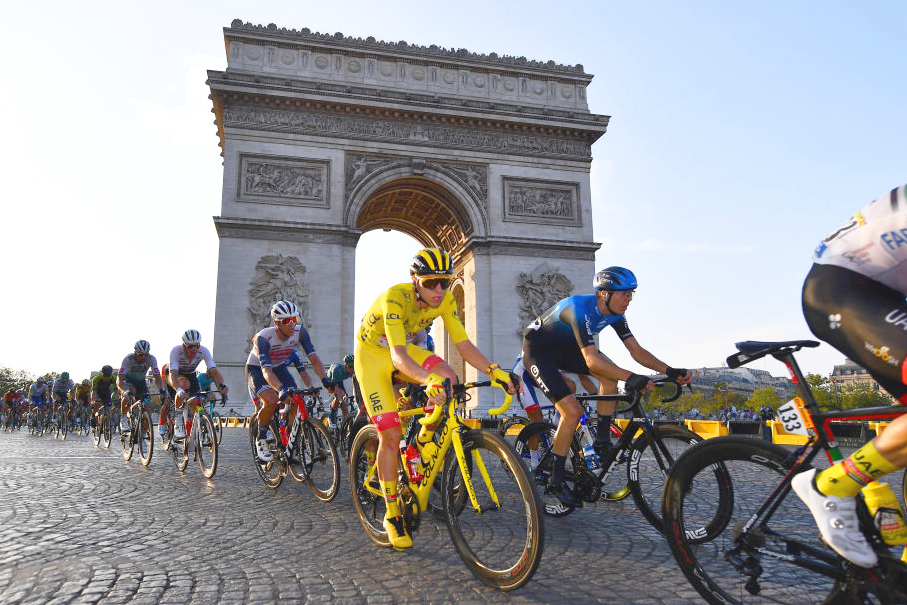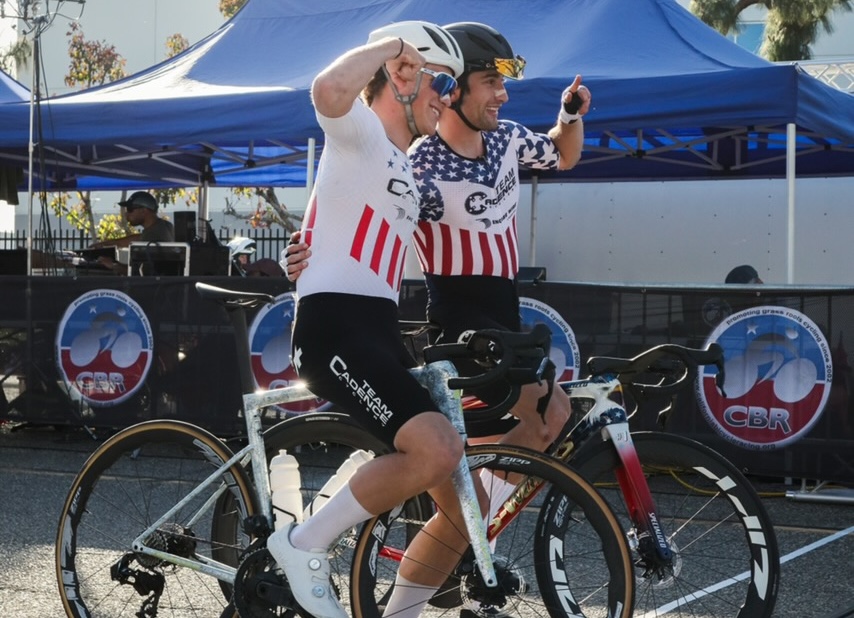Salvaging the WorldTour season: Who got the most out of 2020?
Crunching the numbers of the coronavirus-shortened season

The latest race content, interviews, features, reviews and expert buying guides, direct to your inbox!
You are now subscribed
Your newsletter sign-up was successful
The COVID-19 pandemic severely limited racing opportunities during the 2020 season, even at the highest elite men's level, the UCI WorldTour. The Tour de France, Giro d'Italia and a shortened Vuelta a España went on successfully but almost half of the WorldTour was cancelled. Even so, some riders managed to get in a season of a nearly normal length while others were almost entirely deprived of racing.
Cyclingnews has taken a look at the numbers from a highly unusual 2020 WorldTour season.
In a typical year, WorldTeams tackle around 181 days of racing on four continents across 38 different WorldTour events. The UCI also allows the WorldTeams to compete in ProSeries (formerly HC) and 1.1 or 2.1-ranked events to fill out their calendars.
Because the pandemic led to mass cancellations at all levels, the WorldTeams had to scramble to fill the calendar and faced numerous technical challenges fielding teams once racing resumed. The UCI calendar was packed into a shortened late-July through November period. The WorldTour went from 181 days in 2020 to 115 days this season, and the days in ProSeries and .1-ranked races that are in reach of WorldTeams were more than halved from 319 to 157. However, because of the condensed schedule there were numerous overlapping races including the Giro and Vuelta.
So, despite there being enough racing days to go around, the WorldTour teams averaged only 168 race days this season, compared with 253 in 2019 according to ProCyclingStats.com.
Teams did get creative with their calendars and went to races they might not otherwise have competed in - think Bora-Hansgrohe and Israel Start-Up Nation racing the Sibiu Tour and Ineos Grenadiers leading stacked fields at Tour de l'Ain. The number of WorldTeams racing Vuelta a Burgos went from four to 14 as riders looked for ways to prepare for an abrupt transition from idleness to the Italian Classics and Tour de France.
The reduced availability of racing days meant there was less to go around for the individual riders because the teams still had between 27 and 30 riders each, plus a few trainees and the occasional mid-season transfer and doping sanction.
The latest race content, interviews, features, reviews and expert buying guides, direct to your inbox!
Frequent racing award in the time of COVID-19
There is usually some disparity in the number of race days within teams as more seasoned riders or notable domestiques are fielded in multiple Grand Tours and numerous other events throughout the season while younger riders might get lighter schedules.
The overall average race days in the WorldTour fell from 65.4 days of racing per rider in 2019 to just 39.6 days this season*.
There were still some riders who managed to get in a typical season's worth of racing. 12 riders exceeded 65 days this season: Pello Bilbao (Bahrain McLaren), Michael Mørkøv (Deceuninck-Quickstep), Thomas De Gendt (Lotto Soudal), Michael Valgren (NTT Pro Cycling), Luis Leon Sanchez (Astana), Elia Viviani and Guillaume Martin (Cofidis) and Felix Großschartner (Bora-Hansgrohe), Nans Peters (AG2R La Mondiale), Omar Fraile (Astana) and Alejandro Valverde (Movistar).
Sam Bennett (Deceuninck-QuickStep) made the most of his 68 days of racing to take the Tour de France green jersey and a stage in the Vuelta a España, but it was Arnaud Démare (Groupama-FDJ) who won the most races with 14, including four stages of the Giro d'Italia and the French national title in 'just' 49 days in competition.
Riders who competed in multiple Grand Tours obviously had the most race days but because the Giro d'Italia and Vuelta a España overlapped, there would be no GrandTour triples in 2020, limiting the maximum number of race days a WorldTour rider could put in. The majority of riders were able to get in between 32 and 49 days of racing. But in 2019, the majority of riders got between 57 and 75 days in competition.
All in all, the teams did a better job of spreading the wealth in 2020 than in 2019
- nineteen riders raced few enough days to be statistical outliers this season compared with 28 last year.
Of those outliers, Laurens de Plus (Jumbo-Visma) and Alex Howes (EF Pro Cycling) raced the least, competing in only four days this season for their teams - the least of the WorldTour peloton (trainees excluded). Both came back from the COVID-19 stoppage to race Liège-Bastogne-Liège and La Flèche Wallonne.
Five riders started the season in the spring but did not return to racing after the pandemic-halt: Carlos Betancur (Movistar), who did not get on the 'sports flight' that shuttled Colombians back to Europe in July for personal reasons, Kristoffer Halvorsen (EF Pro Cycling), who opted to end his contract early and return to the Pro Continental level with the Norwegian Uno-X team, Serge Pauwels, who retired from the CCC Team after suffering from a non-COVID viral infection all summer, and Andrey Zeits (Mitchelton-Scott), who was kept from racing due to an unspecified illness - his team says he will return in 2021.
Ian Stannard (Ineos-Grenadiers) only competed in Tour de Pologne in the second half of the season before retiring due to rheumatoid arthritis.
Other riders lacked race days due to injuries, the most serious being Fabio Jakobsen (Deceuninck-Quickstep) in the Tour de Pologne opener, his first race back after the COVID-19 stop. Dylan Groenewegen (Jumbo-Visma), who admitted to causing Jakobsen's crash, also only competed in that one stage before being suspended for his actions. Andreas Stokbro (NTT Pro Cycling) suffered a concussion in a crash in the Czech Tour and did not return afterwards.
*For purposes of this comparison, we've ignored the trainee race days, and measured Fausto Masnada as part of Deceuninck-QuickStep as if he raced there the whole season, even though he moved there after racing in February for the CCC Team. Luis Villalobos, who signed for EF Pro Cycling but was provisionally suspended by the UCI for a GHRP-6 positive dating back to his days with Aevolo in 2019, was not included in the data.
Teams
The 2020 WorldTeams varied in their participation in races during the shortened season, with EF Pro Cycling's riders averaging the least number of race days at 32.97, a bit less than Jumbo-Visma, whose riders averaged 33.07 days. Mitchelton-Scott were the third-lowest at an average of 35 days.
Deceuninck-QuickStep's riders, in contrast, averaged 44.8 days with Trek-Segafredo a close second at 43.9. The majority of the WorldTeams averaged over 40 days of racing per rider.
There still was a significant difference between teams in 2020 in the equality of opportunities for riders because of each team's comfort level amid the pandemic.
EF Pro Cycling were one of the first teams to request a withdrawal from racing when RCS Sport insisted they would go ahead with the March races - Tirreno-Adriatico, Strade Bianche and Milan-San Remo.
Of course, the Italian race organiser was soon forced to cancel as the COVID-19 cases in the Lombardy region rose to a crisis level.
Jumbo-Visma were the next team to withdraw their team from competition in the spring, followed by Mitchelton-Scott, then Astana, Team Ineos and UAE Team Emirates.
The decision kept these teams from racing in Paris-Nice and, when racing resumed, most teams picked up races they would not normally have done - Vuelta a Burgos, Tour de l'Ain, the Czech Tour and Sibiu Tour - but EF Pro Cycling kept to a strict WorldTour-only schedule - the only team to do so. Team manager Jonathan Vaughters said the shorter season was intentional.
"The idea was to keep race days to a minimum, and we needed to do that for two reasons. One, to make sure we were consistently meeting our own stringent COVID mitigation policies and methods by concentrating resources on a smaller number of events. "In other words, we needed to get it right, not race for points and start money," Vaughters told Cyclingnews.
"And two, with fewer races, if something did go wrong, such as multiple COVID positives, then we would be able to better control the situation, as we wouldn't have been cross-contaminating between race 'bubbles' with different sets of staff, etc. Ultimately, we thought fewer race days would be more manageable considering the high standards we placed on our staff and riders to keep everything as COVID (un)friendly as possible. We may have left some points on the table by taking this approach, but we felt like it was the right decision, period."
Quality over quantity
Ultimately, the number of race days did not correlate with team performance. Deceuninck-QuickStep raced the most days and ended the year second overall in the UCI team rankings.
Jumbo-Visma - who raced almost 12 days fewer on average - earned the most UCI points this season, thanks to Primož Roglič's Vuelta a España win and second place in the Tour de France.
Roglič was the number-one ranked rider this season, and Wout Van Aert - with wins in Milan-San Remo and Strade Bianche, second in the Tour of Flanders, plus stage wins in the Tour de France and Critérium du Dauphiné - was third overall.
EF Pro Cycling, who raced the least days, ended the season ranked 10th overall while Israel Start-Up Nation raced the fifth most number of days but were ranked last of the WorldTeams.
Countries
Spanish riders in the WorldTour raced the most this season, getting in about six more days on average than other nationalities, thanks in large part to riders like Pello Bilbao, Luis León Sánchez, Marc Soler, Alejandro Valverde, David de la Cruz, José Rojas and Enric Mas, who all raced two Grand Tours.
French riders, who have the largest contingent in the WorldTour at 56 riders to Spain's 38, also raced more than average at 42.7 days, as did Italians (41.6), Germans (42.2), Polish (41.9), Austrian (43.4) and Slovenian (42.8) but the six Portuguese riders in the WorldTour - Rui Costa, Ivo and Rui Oliveira, Nelson Oliveira, Ruben Guerreiro and João Almeida - pushed their country to the top with 49.3 days on average.
Riders did not use a home turf advantage to get the most racing in during the pandemic - France had the most days of racing in 2020 at 71, Spain held 42 days of racing, Italy 46 - thanks to the Grand Tours' 21 days. Belgium, which put on mostly one-day races, had the most individual events but only 20 days of racing.
All in all, it was a remarkable year for professional cycling, one that could have been much, much worse. When COVID-19 first hit the UAE Tour in February and then began spreading across Europe it looked like there would not be a 2020 road season at all, especially after the postponement of the Olympic Games.
Although a handful of riders became infected with the coronavirus - Fernando Gaviria got it twice - thanks to the efforts of teams and race organisers and the riders and staff taking personal responsibility, there were no major outbreaks in the peloton.
The fact that we have any statistics to analyse from the 2020 WorldTour season is remarkable and gives a glimmer of hope for the 2021 season.

Laura Weislo has been with Cyclingnews since 2006 after making a switch from a career in science. As Managing Editor, she coordinates coverage for North American events and global news. As former elite-level road racer who dabbled in cyclo-cross and track, Laura has a passion for all three disciplines. When not working she likes to go camping and explore lesser traveled roads, paths and gravel tracks. Laura specialises in covering doping, anti-doping, UCI governance and performing data analysis.
